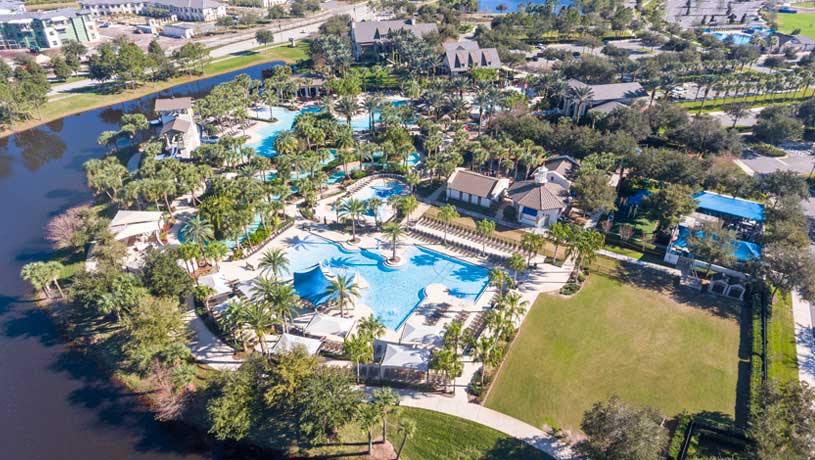KEY POINTS: CDD Fees
• CDD Fees usually come with amazing amenities, but their cost can surprise new homeowners.
• Learn what these fees are and what they pay for in your neighborhood.
• How much are CDD Fees, how long do they last, and can they be paid off early?
• Understand the difference between HOA and CDD Fees.
If you have been looking for a home in Florida in 2026, or are considering looking for one in the near future, it is likely you have seen on a listing or heard your real estate agent mention the term "CDD Fees."
Then, after you hear how much these fees can be, you probably have even more questions.
Let's take a deep dive into what are CDD fees, how much they are, how long they last, and how they are paid.
What are CDD Fees?
A Community Development District (CDD) is a special purpose government entity created under Florida law as a means of financing infrastructure and providing services to large-scale residential and commercial developments.
CDD fees are charges imposed on homeowners within a CDD to pay for the construction and maintenance of infrastructure, community amenities, and other services within the district.
In other words, the attraction for many new communities in Florida, including our local market of Jacksonville, is the amazing amenities that are built right inside the community. These amenities often include large clubhouses, resort-style pools, splash parks, waterslides, fitness centers, tennis courts, pickleball courts, other playing fields, kayak and canoe launches, and more.

The amenities in a CDD-governed community usually resemble something out of a resort. These amenities for Nocatee, FL are some of the nicest in all of Florida, making Nocatee one of the most popular choices for homebuyers in our area.
Of course, someone must pay for these amenities as well as the associated ongoing maintenance, and instead of the developer just eating this expensive cost, the cost is passed along through the CDD to the homeowners.
CDD fees may also be used to pay for infrastructure such as roads, bridges, water and sewer systems, and other essential services.
How much are CDD Fees?
The amount paid for the CDD is different for each community and can even vary based on the size of the property.
We typically see CDD fees range from $1,000 annually to $4,000 annually.
CDD fees are usually set by the district's governing board and may be adjusted on an annual basis based on the needs of the district and the cost of providing services. As such, home buyers should consider the potential for future increases in CDD fees when budgeting for their monthly expenses.
How are CDD Fees Paid?
CDD Fees are paid as part of a homeowner's property taxes.
Therefore, if you used a mortgage to purchase your home, your mortgage payment each month will account for:
(1) the principle
(2) interest
(3) homeowner's insurance
(4) property taxes
(5) your CDD fee
Then, when property taxes are due each year, the CDD fees will be paid from your escrow account by your lender as part of your property taxes.
If you paid cash for your home, the CDD fees will be included on your property tax bill each year.
How Long Do CDD Fees Last?
A CDD fee has two components: (1) a bond portion, and (2) an operating and maintenance portion.
The bond portion is typically a 20 to 30 year bond that pays off the debt that has been financed for the construction of the infrastructure and community amenities. When the bond portion has been paid off at the end of the term of the bond, this portion of the CDD fee is removed for the homeowners.
Alternatively, the operating and maintenance portion facilitates the operation and maintenance of the infrastructure and amenities. This portion of the CDD fee is ongoing and must be paid as long as the homeowner owns the property inside the CDD.
Generally, but not always, the bond fee and the operating and maintenance fee make up 50% each of the total fee. So, when the bond portion of the CDD fee is paid off at the end of the term, the total CDD fee paid is cut in half.
Can CDD Fees Be Paid Off in Advance?
Yes! - with a caveat.
The bond portion of the CDD fee may be paid off in advance, but the operating and maintenance portion is paid as long as the homeowner owns the property.
Typically, a homeowner can receive a discount of 2-5% for paying off the bond portion in advance.
This is also attractive for selling your home in the future as the property can be marketed as having the bond portion of the CDD paid off. However, it is important to note that the data shows that you likely won't fully recover the cost of paying off the CDD bond fee when selling your home.
Before paying off the bond portion of the CDD fee, consider:
(1) If you plan to move in the future where paying off the CDD bond fee only provides benefit to the new homeowner
(2) The opportunity cost of paying off the CDD bond fee versus investing your money elsewhere with a greater return
What is the difference between an HOA fee and CDD fee?
As mentioned previously, a CDD is a special purpose government entity. Conversely, an HOA is an organization created and operated by the homeowners that is the governing body of the community.
CDD fees are paid annually as part of your property taxes, while HOA fees are paid on a scheduled determine by the HOA (e.g., monthly, quarterly, semi-annually, or annually). HOA fees are assessed to cover administration expenses, maintenance of common areas, community landscaping, gated community entrances, and more.
As a result, it is possible that a community may have both CDD fees and HOA fees. However, in these cases, the HOA fee is usually minimal (e.g, $50 per year).
Bottom Line
Understanding CDD fees is an important part of the home buying process. CDD fees can significantly impact a home buyer's monthly expenses and overall budget, so it's crucial for buyers to be aware of these fees and understand what they are paying for.
If you are considering a buying a home in a CDD and plan to get a mortgage to finance the purchase, be sure to let your lender know that you are looking at a home in one of these communities. The additional cost often pushes buyers over the amount they can afford (high debt-to-income ratio), leaving buyers disappointed later in the process.
But with proper planning and knowledge, the benefits of the fantastic amenities often make the fees worthwhile in a CDD-governed community.
